*NURSING > QUESTIONS & ANSWERS > Essentials of psychiatric mental health test bank Shuo (All)
Essentials of psychiatric mental health test bank Shuo
Document Content and Description Below
Bonus Chapter 1: Concepts of Personality Development Multiple Choice Identify the choice that best completes the statement or answers the question. 1. A jilted college student is a... dmitted to a hospital following a suicide attempt and states, “No one will ever love a loser like me.” According to Erikson’s theory of personality development, a nurse should recognize that this patient has a deficit in which developmental stage? 1. Trust versus mistrust 2. Initiative versus guilt 3. Intimacy versus isolation 4. Ego integrity versus despair 2. A nurse observes a 3-year-old client willingly sharing candy with a sibling. According to Peplau, which psychological stage of development should the nurse determine that this child has completed? 1. Learning to count on others 2. Learning to delay satisfaction 3. Identifying oneself 4. Developing skills in participation 3. A 9-month-old child screams every time his mother leaves and will not tolerate anyone else changing his diaper. The nurse should determine that, according to Mahler’s developmental theory, this child’s development was arrested at which phase? 1. The autistic phase 2. The symbiotic phase 3. The separation-individuation phase 4. The rapprochement phase 4. According to Peplau, a nurse who provides an abandoned child with parental guidance and praise following small accomplishments is serving which therapeutic role? 1. Technical expert 2. Resource person 3. Surrogate 4. Leader 5. When assessing clients, a psychiatric nurse should understand that psychoanalytic theory is based on which underlying concept? 1. A possible genetic basis for the client’s problems 2. The structure and dynamics of the personality 3. Behavioral responses to stressors 4. Maladaptive cognitions 6. Which underlying concept should a nurse associate with interpersonal theory when assessing a client? 1. The effects of social processes on personality development 2. The effects of unconscious processes and personality structures 3. The effects on thoughts and perceptual processes 4. The effects of chemical and genetic influences 7. A physically healthy, 35-year-old, single client lives with his parents, who provide total financial support. According to Erikson’s theory, which developmental task should a nurse assist the client to accomplish? 1. Establishing the ability to control emotional reactions 2. Establishing a strong sense of ethics and character structure 3. Establishing and maintaining self-esteem 4. Establishing a career, personal relationships, and societal connections 8. A 1-month-old infant is left alone for extended periods, has little physical stimulation, and is malnourished. Based on this infant’s situation, in which phase of development, according to Mahler’s theory, should a nurse expect to see a potential deficit? 1. The symbiotic phase 2. The autistic phase 3. The consolidation phase 4. The rapprochement phase 9. A 6-year-old boy uses his father’s flashlight to explore his 3-year-old sister’s genitalia. According to Freud, in which stage of psychosocial development should a nurse identify this behavior as normal? 1. Oral 2. Anal 3. Phallic 4. Latency 10. A married, 26-year-old client works as a schoolteacher. She and her husband have just had their first child. A nurse should recognize that this client is successfully accomplishing which stage of Erikson’s developmental theory? 1. Industry versus inferiority 2. Identity versus role confusion 3. Intimacy versus isolation 4. Generativity versus stagnation 11. A 10-year-old child wins the science fair competition and is chosen as a cheerleader for the basketball team. A nurse should recognize that this child is in the process of successfully accomplishing which stage of Erikson’s developmental theory? 1. Industry versus inferiority 2. Identity versus role confusion 3. Intimacy versus isolation 4. Generativity versus stagnation 12. A client has flashbacks of sexual abuse by her uncle. She did not have these memories until recently, when she became sexually active with her boyfriend. A nurse should identify this experience as which part of Sullivan’s concept of the self-system? 1. The good me 2. The bad me 3. The not me 4. The bad you 13. According to Freud, which statement should a nurse associate with predominance of the superego? 1. “No one is looking, so I will take three cigarettes from Mom’s pack.” 2. “I don’t ever cheat on tests; it is wrong.” 3. “If I skip school, I will get into trouble and fail my test.” 4. “Dad won’t miss this little bit of vodka.” 14. A female complains that her husband only satisfies his sexual needs and never her needs. According to Freud, which personality structure should a nurse identify as predominantly driving the husband’s actions? 1. The id 2. The superid 3. The ego 4. The superego 15. A father of a 5-year-old demeans and curses his child for disobedience. In turn, when upset, the child uses swear words at kindergarten. A school nurse recognizes this behavior as unsuccessful completion of which stage of development, according to Peplau? 1. Learning to count on others 2. Learning to delay satisfaction 3. Identifying oneself 4. Developing skills in participation 16. A nurse is caring for a hospitalized client who is quarrelsome, opinionated, and has little regard for others. According to Sullivan’s interpersonal theory, the nurse should associate the client’s behaviors with a previous deficit in which stage of development? 1. Infancy 2. Childhood 3. Early adolescence 4. Late adolescence Completion Complete each statement. 17. “It is never right to take something that doesn’t belong to you.” According to Sigmund Freud, this statement reflects the predominance of the structure of the personality. Bonus Chapter 1: Concepts of Personality Development Answer Section MULTIPLE CHOICE 1. ANS: 3 2. ANS: 2 3. ANS: 2 4. ANS: 3 5. ANS: 2 6. ANS: 1 Chapter: Bonus Chapter 1, Concepts of Personality Development Objective: Interpersonal Theory—Sullivan Page: 5 Heading: Interpersonal Theory Integrated Processes: Nursing Process Client Need: Psychosocial Integrity Cognitive Level: Application [Applying] Concept: Cognition Difficulty: Moderate Feedback 1 The nurse should associate interpersonal theory with the underlying concept of effects of social process on personality development. Sullivan developed stages of personality development based on his theory of interpersonal relationships and their effect on personality and individual behavior. 2 Sullivan’s theory did not include unconscious processes and personality structures. 3 Sullivan’s theory did not include thoughts and perceptual processes. 4 Sullivan’s theory did not include chemical and genetic influences. PTS: 1 CON: Cognition 7. ANS: 4 Chapter: Bonus Chapter 1, Concepts of Personality Development Objective: Theory of psychosocial development—Erikson Page: 9 Heading: Theory of Psychosocial Development >Erikson’s Stages of Personality Development Integrated Processes: Nursing Process Client Need: Psychosocial Integrity Cognitive Level: Application [Applying] Concept: Family Dynamics Difficulty: Moderate Feedback 1 The ability to control emotional reactions occurs in the initiative versus guilt stage. 2 Establishing a strong sense of ethics and character occurs in the identity versus role confusion stage. 3 Establishing and maintaining self-esteem occurs in the industry versus inferiority stage. 4 The nurse should assist the client in establishing a career, personal relationships, and societal connections. According to Erikson, non-achievement of the generativity versus stagnation stage results in self-absorption, including withdrawal from others and having no capacity for giving of the self to others. PTS: 1 CON: Family Dynamics 8. ANS: 2 Chapter: Bonus Chapter 1, Concepts of Personality Development Objective: Theory of object relations development—Mahler Page: 10 Heading: Theory of Object Relations > Phase I: The Autistic Phase Integrated Processes: Nursing Process Client Need: Physiological Integrity: Physiological Adaptation Cognitive Level: Application [Applying] Concept: Growth and Development Difficulty: Moderate Feedback 1 The symbiotic phase occurs at 1–5 months of age. 2 The nurse should expect that a 1-month-old infant who is left alone, has little physical stimulation, and is malnourished would not meet the autistic phase of development. The autistic phase of development usually occurs from birth to 1 month, at which time the infant’s focus is on basic needs and comfort. 3 The consolidation phase occurs at ages 24–36 months. 4 The rapprochement phase occurs at ages 16–24 months. PTS: 1 CON: Growth and Development 9. ANS: 3 Chapter: Bonus Chapter 1, Concepts of Personality Development Objective: Psychoanalytic theory—Freud Page: 5 Heading: Psychosocial Development > Phallic Stage 3-6 years Integrated Processes: Assessment Client Need: Psychosocial Integrity Cognitive Level: Application [Applying] Concept: Growth and Development Difficulty: Moderate Feedback 1 The oral stage occurs at ages birth to 18 months and includes: chewing, sucking and biting behaviors. 2 The anal phase occurs 18 months to 3 years and involves gaining independence and control. 3 The nurse should identify this behavior as normal, because the 6-year-old client who focuses on genital organs is in the phallic stage of Freud’s psychosexual stages of development. Children in the phallic stage of development focus on genital organs and develop a sense of sexual identity. Identification with the same-sex parent also occurs at this stage. 4 The latency phase occurs ages 6–12 years old and involves socialization with peers. PTS: 1 CON: Growth and Development 10. ANS: 3 Chapter 1: Bonus Chapter 1, Concepts of Personality Development Objective: Theory of psychosocial development—Erikson Page: 9 Heading: Theory of Psychosocial Development > Erikson’s Stages of Personality Development Integrated Processes: Nursing Process Client Need: Psychosocial Integrity Cognitive Level: Application [Applying] Concept: Growth and Development Difficulty: Moderate Feedback 1 Industry versus inferiority occurs between ages 6 and 12 years old. 2 Identity versus role confusion occurs between ages 12 and 20 years old. 3 The nurse should recognize that a 26-year-old client who is married and has a child has successfully accomplished the intimacy versus isolation stage of Erikson’s developmental theory. The intimacy versus isolation stage of young adulthood involves forming lasting relationships. Achievement of this task results in the capacity for mutual love and respect. 4 Generativity versus stagnation occurs between ages 30 and 65 years old. PTS: 1 CON: Growth and Development 11. ANS: 1 Chapter: Bonus Chapter 1, Concepts of Personality Development Objective: Theory of psychosocial development Page: 8 Heading: Theory of Psychosocial Development > Erikson’s Stages of Personality Development Integrated Processes: Nursing Process Client Need: Psychosocial Integrity Cognitive Level: Application [Applying] Concept: Growth and Development Difficulty: Moderate Feedback 1 The nurse should recognize that a 10-year-old child who is successful in school both academically and socially has effectively accomplished the industry versus inferiority developmental stage of Erikson’s psychosocial theory. The industry versus inferiority stage of development usually occurs between 6 and 12 years of age, at which time individuals achieve a sense of self-confidence by learning, competing, performing successfully, and receiving recognition from others. 2 Identity versus role confusion occurs between the ages of 12 and 20 years. 3 Intimacy versus isolation occurs between the ages of 20 and 30 years. 4 Generativity versus stagnation occurs between the ages of 30 and 65. PTS: 1 CON: Growth and Development 12. ANS: 3 Chapter: Bonus Chapter 1, Concepts of Personality Development Objective: Interpersonal theory—Sullivan Page: 5 Heading: Interpersonal Theory Integrated Processes: Nursing Process Client Need: Psychosocial Integrity Cognitive Level: Application [Applying] Concept: Violence Difficulty: Moderate Feedback 1 The good me develops in response to positive feedback. 2 The bad me develops in response to negative feedback. 3 The nurse should identify a client remembering sexual abuse when becoming sexually active with her boyfriend as experiencing the not me part of the personality. According to Sullivan, the not me part of the personality develops in response to situations that produced intense anxiety in childhood. 4 The bad you is not a component of Sullivan’s self-system. PTS: 1 CON: Violence 13. ANS: 2 Chapter: Bonus Chapter 1, Concepts of Personality Development Objective: Psychoanalytic theory—Freud Page: 2–3 Heading: Psychoanalytic Theory > Structure of the Personality Integrated Processes: Nursing Process Client Need: Psychosocial Integrity Cognitive Level: Application [Applying] Concept: Growth and Development Difficulty: Moderate Feedback 1 Option 1 indicates the predominance of the id, or the pleasure principle. 2 The nurse should associate the statement “I don’t ever cheat on tests; it is wrong” as indicative of the predominance of the superego. Freud described the superego as the part of the personality that internalizes the values and morals set forth by primary caregivers. The superego can be referred to as the “perfection principle.” 3 Option 3 indicates the predominance of the ego, or the reality principle. 4 Option 4 indicates the predominance of the id, or the pleasure principle. PTS: 1 CON: Growth and Development 14. ANS: 1 Chapter: Bonus Chapter 1, Concepts of Personality Development Objective: Psychoanalytic theory—Freud Page: 2–3 Heading: Psychoanalytic Theory > Structure of the Personality Integrated Processes: Nursing Process Client Need: Psychosocial Integrity Cognitive Level: Application [Applying] Concept: Addiction and Behaviors Difficulty: Moderate Feedback 1 The nurse should identify that the husband’s actions are driven by the predominance of the id. According to Freud, the id is the part of the personality that is identified as the pleasure principle. The id is the locus of instinctual drives. 2 The superid is not one of Freud’s components of personality. 3 The ego is the reality principle. 4 The superego is the perfection principle. PTS: 1 CON: Addiction and Behaviors 15. ANS: 3 Chapter: Bonus Chapter 1, Concepts of Personality Development Objective: A nursing model of interpersonal development—Peplau Page: 11–12 Heading: A Nursing Model—Hildegard E. Peplau > Peplau’s Stages of Personality Development Integrated Processes: Nursing Process Client Need: Psychosocial Integrity Cognitive Level: Application [Applying] Concept: Growth and Development Difficulty: Moderate Feedback 1 Learning to count on others occurs in stage one when newborns have needs met. 2 Learning to delay satisfaction occurs in stage two. 3 The nurse should identify that the child using swear words in kindergarten has not successfully completed the identifying oneself stage, according to Peplau’s interpersonal theory. During this stage of early childhood, a child learns to structure self-concept by observing how others interact with him or her. 4 Developing skills in participation occurs in stage four. PTS: 1 CON: Growth and Development 16. ANS: 2 Chapter 1: Bonus Chapter 1, Concepts of Personality Development Objective: Interpersonal Theory—Sullivan Page: 6 Heading: Interpersonal Theory Integrated Processes: Nursing Process Client Need: Psychosocial Integrity Cognitive Level: Application [Applying] Concept: Growth and Development Difficulty: Moderate Feedback 1 A deficit in the infancy stage of development would not cause the client to have anxiety with delayed gratification. 2 The nurse should associate the client’s behavior with a deficit in the childhood stage of Sullivan’s interpersonal theory. The childhood stage in Sullivan’s interpersonal theory typically occurs from 18 months to 6 years of age, during which the child learns to experience a delay in personal gratification without undue anxiety. 3 A deficit in the early adolescence stage of development would not cause the client to have anxiety with delayed gratification. 4 A deficit in the late adolescence stage of development would not cause the client to have anxiety with delayed gratification. PTS: 1 CON: Growth and Development COMPLETION 17. ANS: superego Chapter 1: Bonus Chapter 1, Concepts of Personality Development Objective: Psychoanalytic theory—Freud Page: 2–3 Heading: Psychoanalytic Theory > Structure of the Personality Integrated Processes: Teaching and Learning Client Need: Psychosocial Development Cognitive Level: Analysis[Analyzing] Concept: Growth and Development Difficulty: Moderate Feedback: According to Sigmund Freud, the statement “It is never right to take something that doesn’t belong to you” reflects the predominance of the superego structure of the personality. Freud organized the structure of personality into three major components: the id, the ego, and the superego, which are distinguished by their unique functions and different characteristics. The superego is the perfection principle, in which the values and morals set forth by primary caregivers are internalized. PTS: 1 CON: Growth and Development Chapter 1: Mental Health and Mental Illness Multiple Choice Identify the choice that best completes the statement or answers the question. 1. A nurse is assessing a client who is experiencing occasional feelings of sadness because of the recent death of a beloved pet. The client’s appetite, sleep patterns, and daily routine have not changed. How should the nurse interpret the client’s behaviors? 1. The client’s behaviors demonstrate mental illness in the form of depression. 2. The client’s behaviors are extensive, which indicates the presence of mental illness. 3. The client’s behaviors are not congruent with cultural norms. 4. The client’s behaviors demonstrate no functional impairment, indicating no mental illness. 2. At what point should the nurse determine that a client is at risk for developing a mental illness? 1. When thoughts, feelings, and behaviors are not reflective of the DSM-5 criteria. 2. When maladaptive responses to stress are coupled with interference in daily functioning. 3. When a client communicates significant distress. 4. When a client uses defense mechanisms as ego protection. 3. A nurse is assessing a set of 15-year-old identical twins who respond very differently to stress. One twin becomes anxious and irritable, and the other withdraws and cries. How should the nurse explain these different stress responses to the parents? 1. Reactions to stress are relative rather than absolute; individual responses to stress vary. 2. It is abnormal for identical twins to react differently to similar stressors. 3. Identical twins should share the same temperament and respond similarly to stress. 4. Environmental influences to stress weigh more heavily than genetic influences. 4. Which client should the nurse anticipate to be most receptive to psychiatric treatment? 1. A Jewish, female social worker. 2. A Baptist, homeless male. 3. A Catholic, black male. 4. A Protestant, Swedish business executive. 5. A psychiatric nurse intern states, “This client’s use of defense mechanisms should be eliminated.” Which is a correct evaluation of this nurse’s statement? 1. Defense mechanisms can be appropriate responses to stress and need not be eliminated. 2. Defense mechanisms are a maladaptive attempt of the ego to manage anxiety and should always be eliminated. 3. Defense mechanisms, used by individuals with weak ego integrity, should be discouraged and not eliminated. 4. Defense mechanisms cause disintegration of the ego and should be fostered and encouraged. 6. During an intake assessment, a nurse asks both physiological and psychosocial questions. The client angrily responds, “I’m here for my heart, not my head problems.” Which is the nurse’s best response? 1. “It is just a routine part of our assessment. All clients are asked these same questions.” 2. “Why are you concerned about these types of questions?” 3. “Psychological factors, like excessive stress, have been found to affect medical conditions.” 4. “We can skip these questions, if you like. It isn’t imperative that we complete this section.” 7. An employee uses the defense mechanism of displacement when the boss openly disagrees with suggestions. What behavior would be expected from this employee? 1. The employee assertively confronts the boss. 2. The employee leaves the staff meeting to work out in the gym. 3. The employee criticizes a coworker. 4. The employee takes the boss out to lunch. 8. A fourth-grade boy teases and makes jokes about a cute girl in his class. This behavior should be identified by a nurse as indicative of which defense mechanism? 1. Displacement 2. Projection 3. Reaction formation 4. Sublimation 9. Which nursing statement about the concept of neurosis is most accurate? 1. An individual experiencing neurosis is unaware that he or she is experiencing distress. 2. An individual experiencing neurosis feels helpless to change his or her situation. 3. An individual experiencing neurosis is aware of the psychological causes of his or her behavior. 4. An individual experiencing neurosis has a loss of contact with reality. 10. Which nursing statement regarding the concept of psychosis is most accurate? 1. Individuals experiencing psychoses are aware that their behaviors are maladaptive. 2. Individuals experiencing psychoses experience little distress. 3. Individuals experiencing psychoses are aware of experiencing psychological problems. 4. Individuals experiencing psychoses are based in reality. 11. When under stress, a client routinely uses alcohol to excess. Finding her drunk, her husband yells at the client about her chronic alcohol abuse. Which action alerts the nurse to the client’s use of the defense mechanism of denial? 1. The client hides liquor bottles in a closet. 2. The client yells at her son for slouching in his chair. 3. The client burns dinner on purpose. 4. The client says to the spouse, “I don’t drink too much!” 12. Devastated by a divorce from an abusive husband, a wife completes grief counseling. Which statement by the wife should indicate to a nurse that the client is in the acceptance stage of grief? 1. “If only we could have tried again, things might have worked out.” 2. “I am so mad that the children and I had to put up with him as long as we did.” 3. “Yes, it was a difficult relationship, but I think I have learned from the experience.” 4. “I still don’t have any appetite and continue to lose weight.” 13. A nurse is performing a mental health assessment on an adult client. According to Maslow’s hierarchy of needs, which client action would demonstrate the highest achievement in terms of mental health? 1. Maintaining a long-term, faithful, intimate relationship 2. Achieving a sense of self-confidence 3. Possessing a feeling of self-fulfillment and realizing full potential 4. Developing a sense of purpose and the ability to direct activities [Show More]
Last updated: 1 year ago
Preview 1 out of 427 pages

Reviews( 0 )
Document information
Connected school, study & course
About the document
Uploaded On
Sep 06, 2021
Number of pages
427
Written in
Additional information
This document has been written for:
Uploaded
Sep 06, 2021
Downloads
0
Views
373

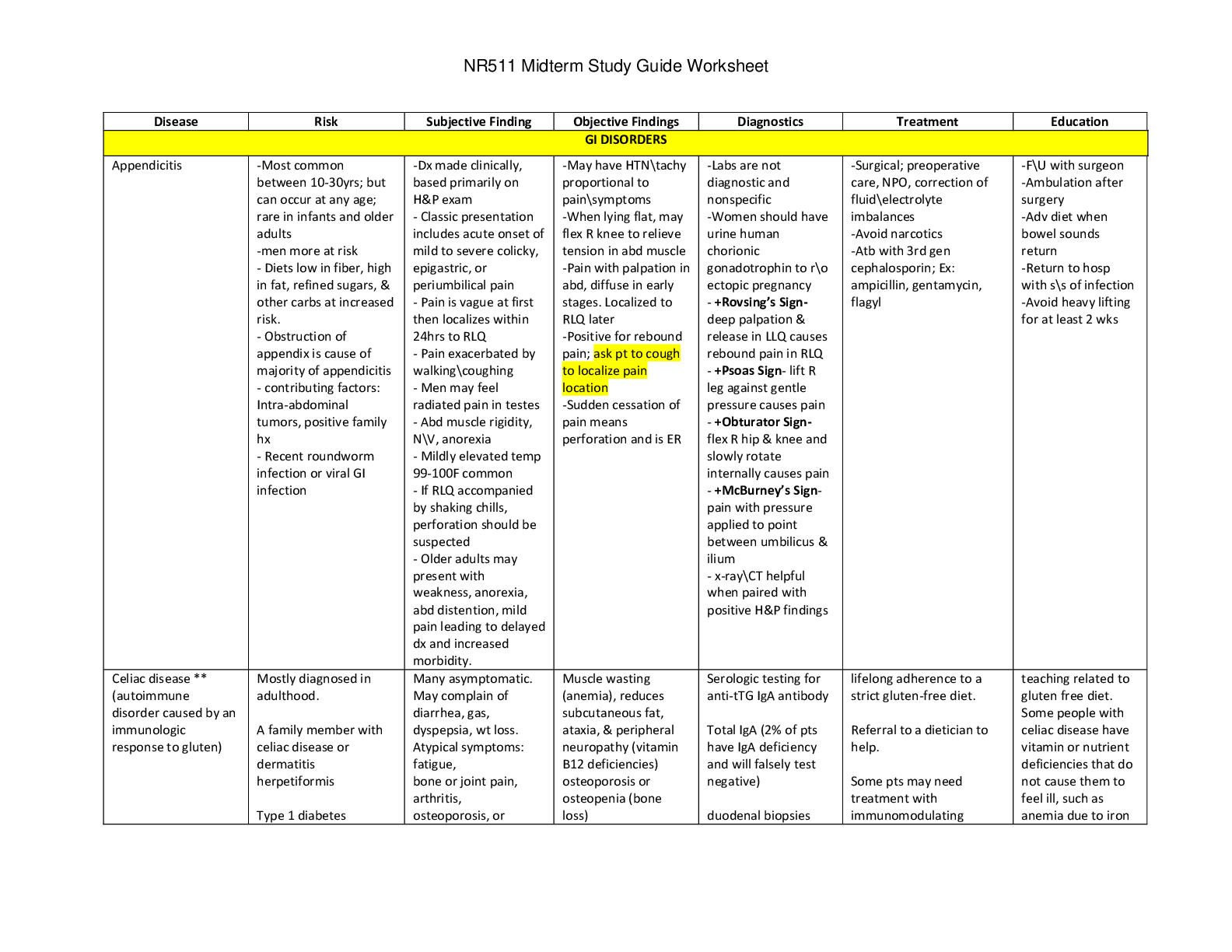
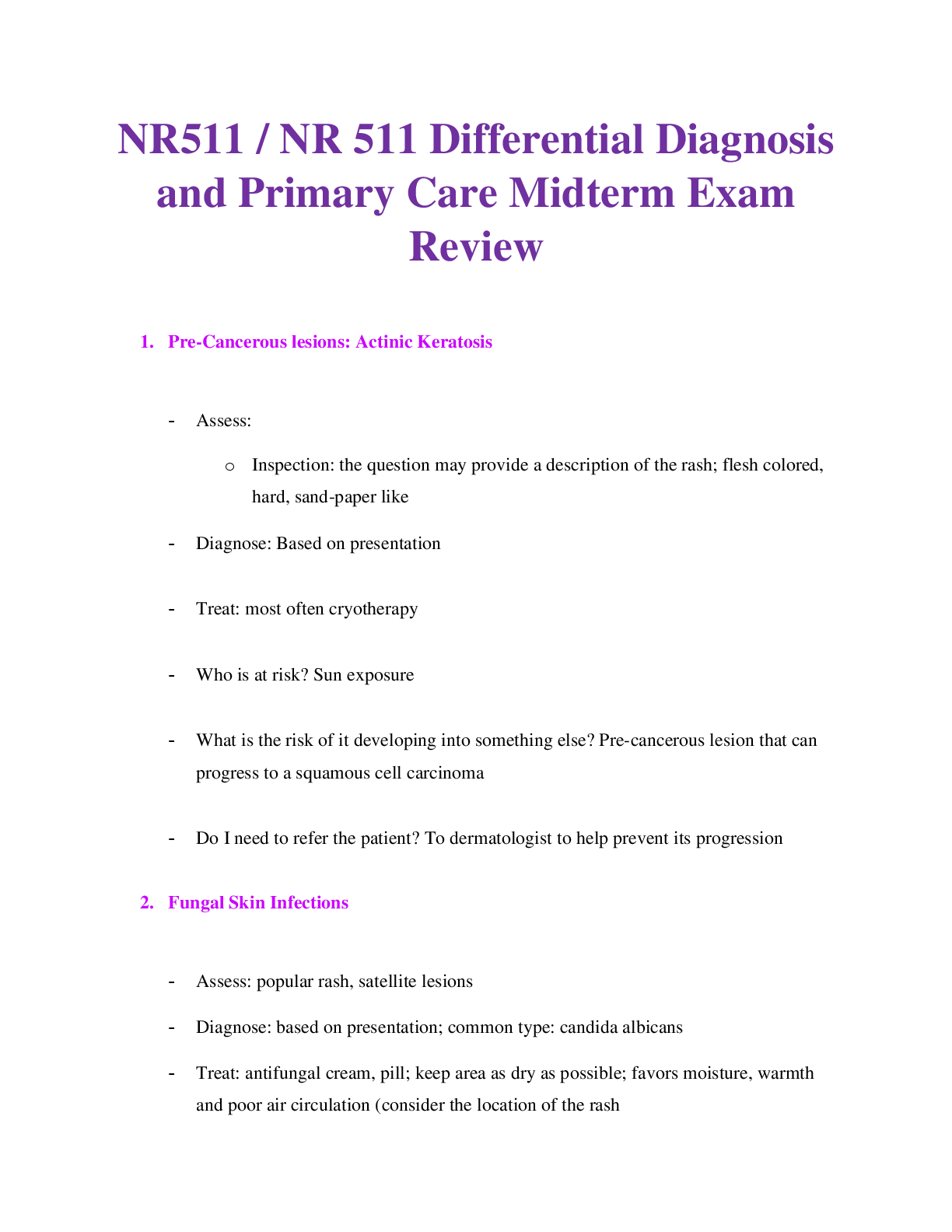
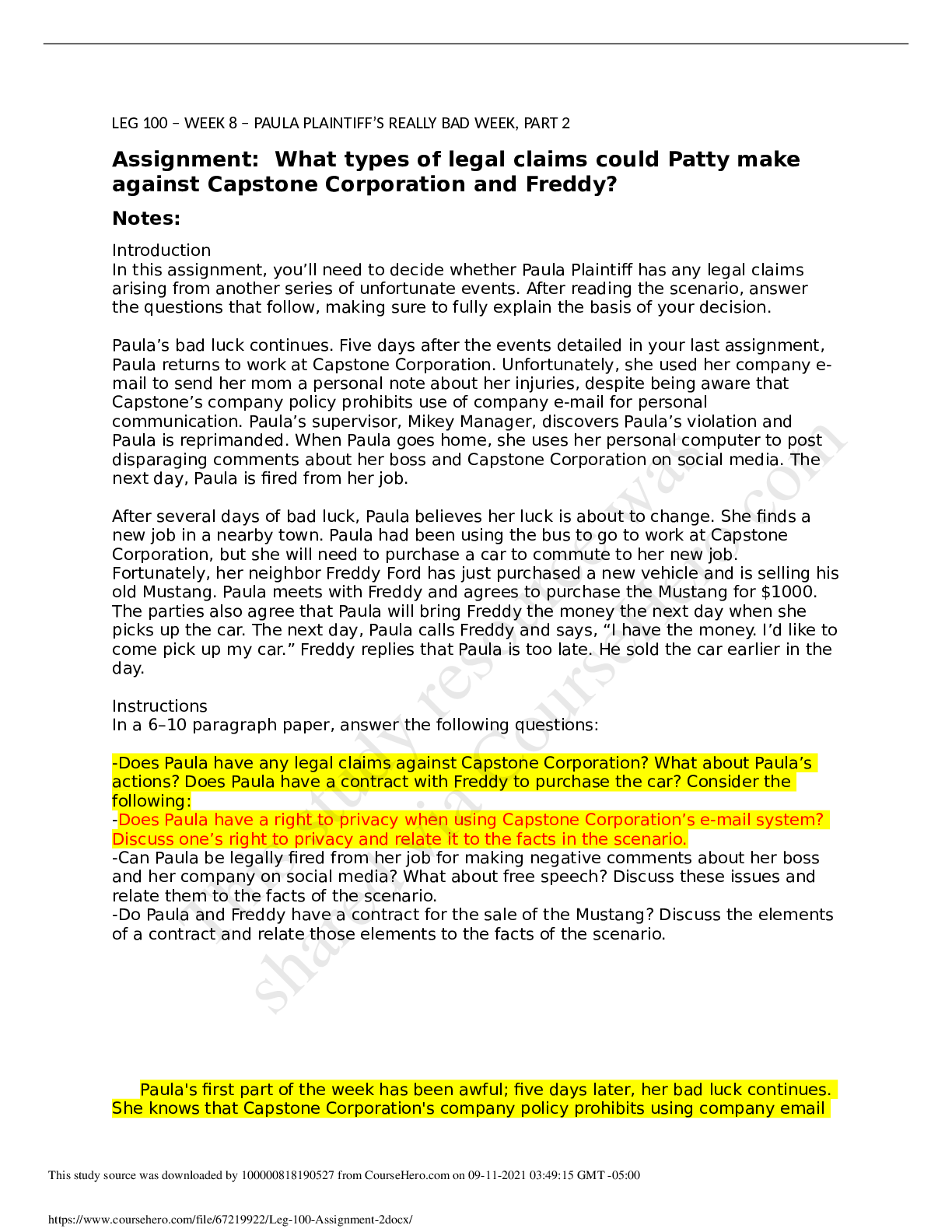
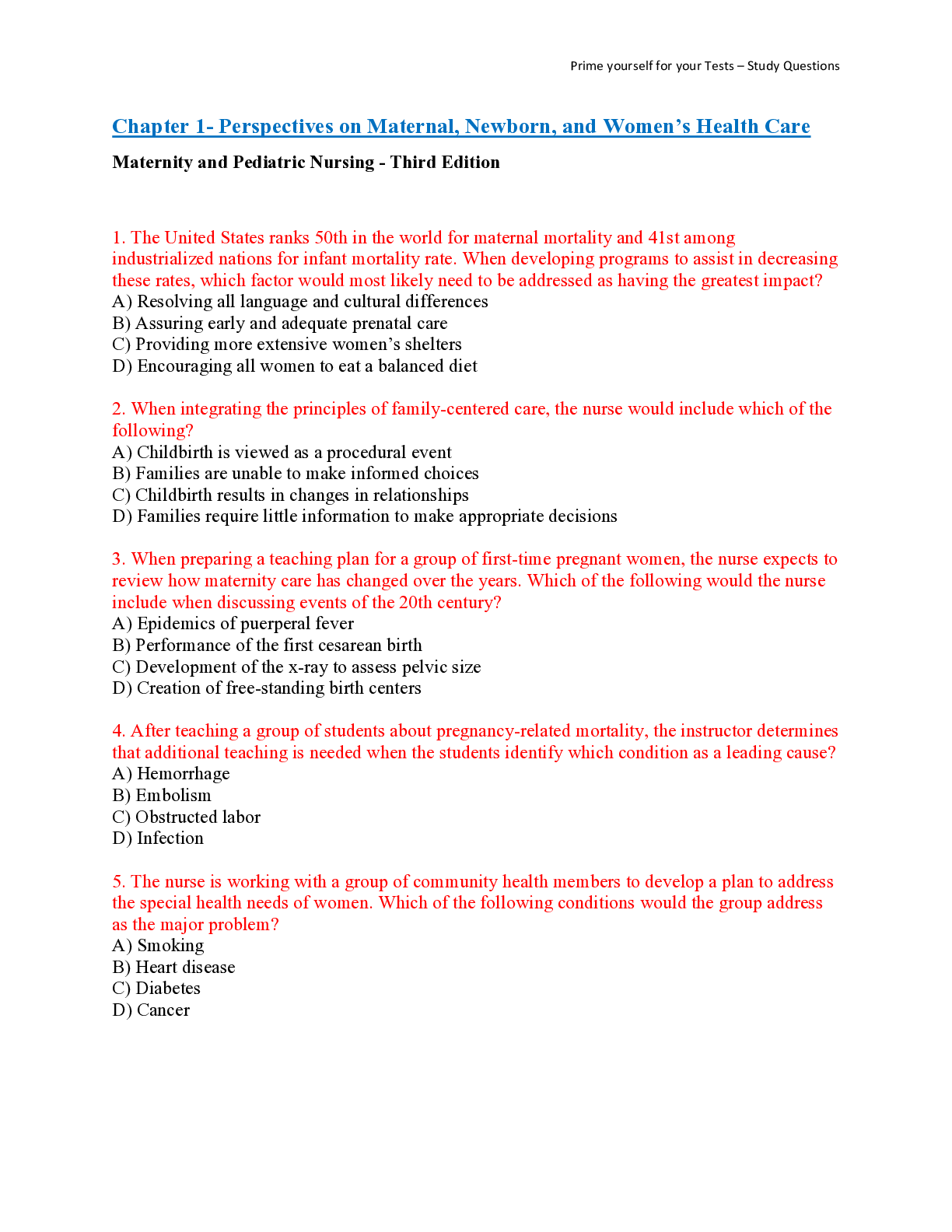
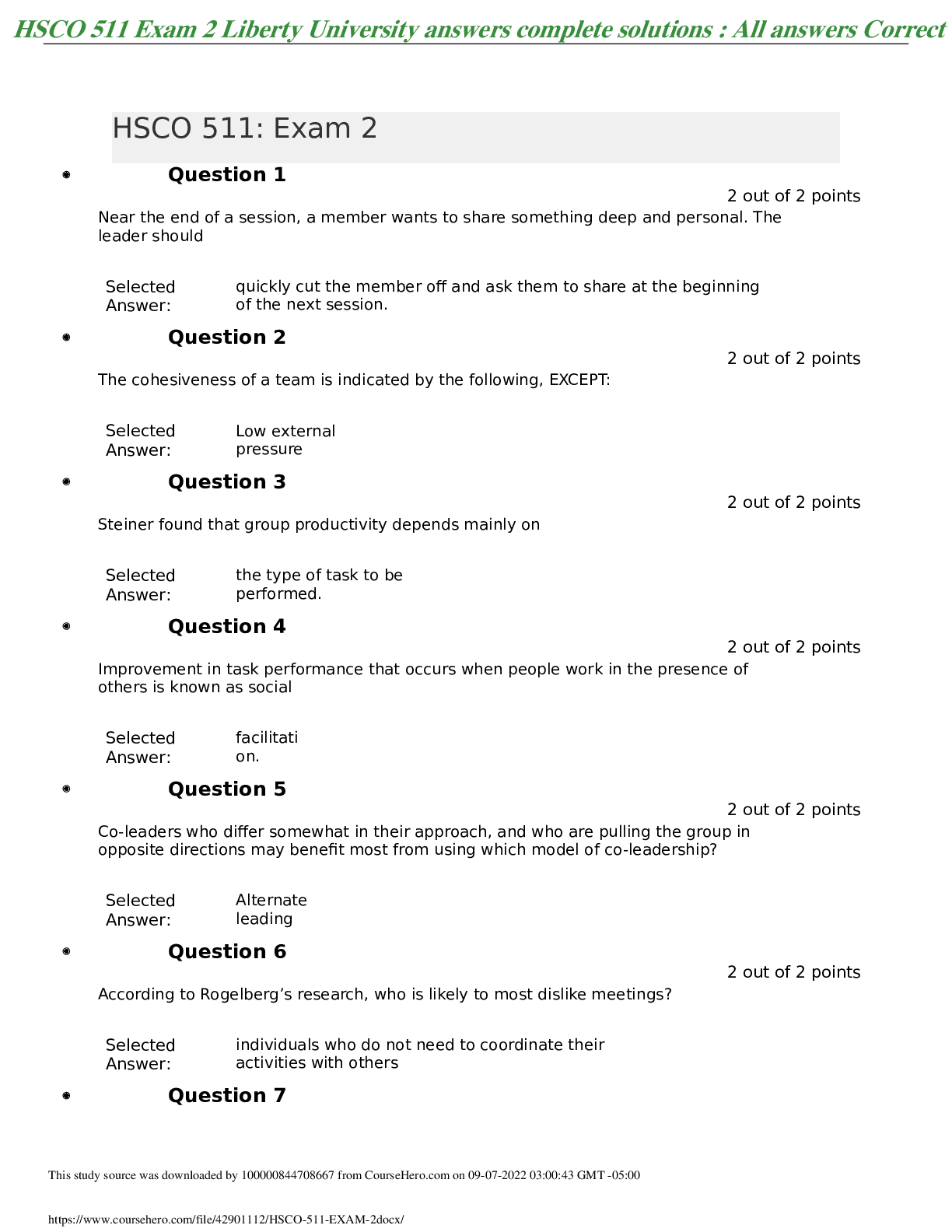
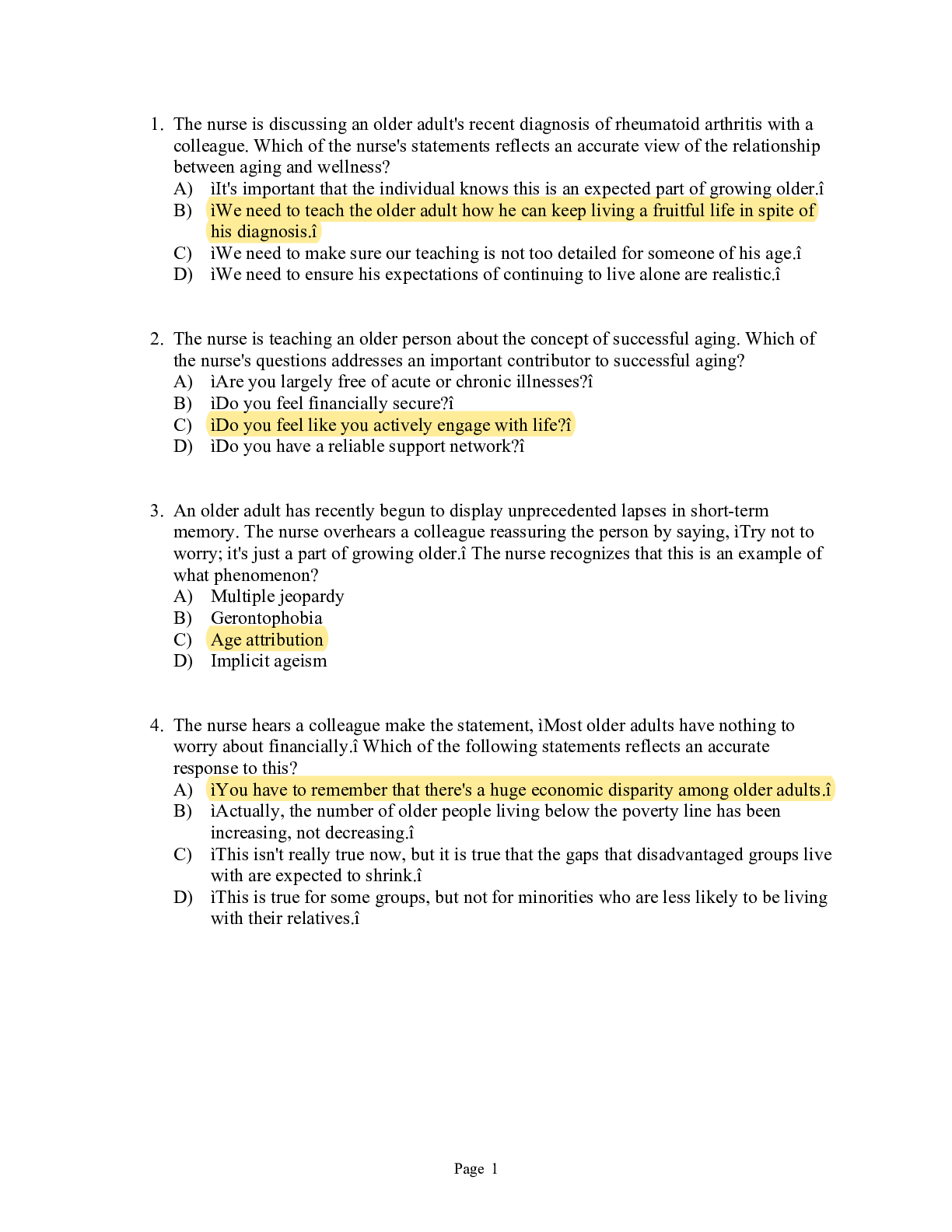
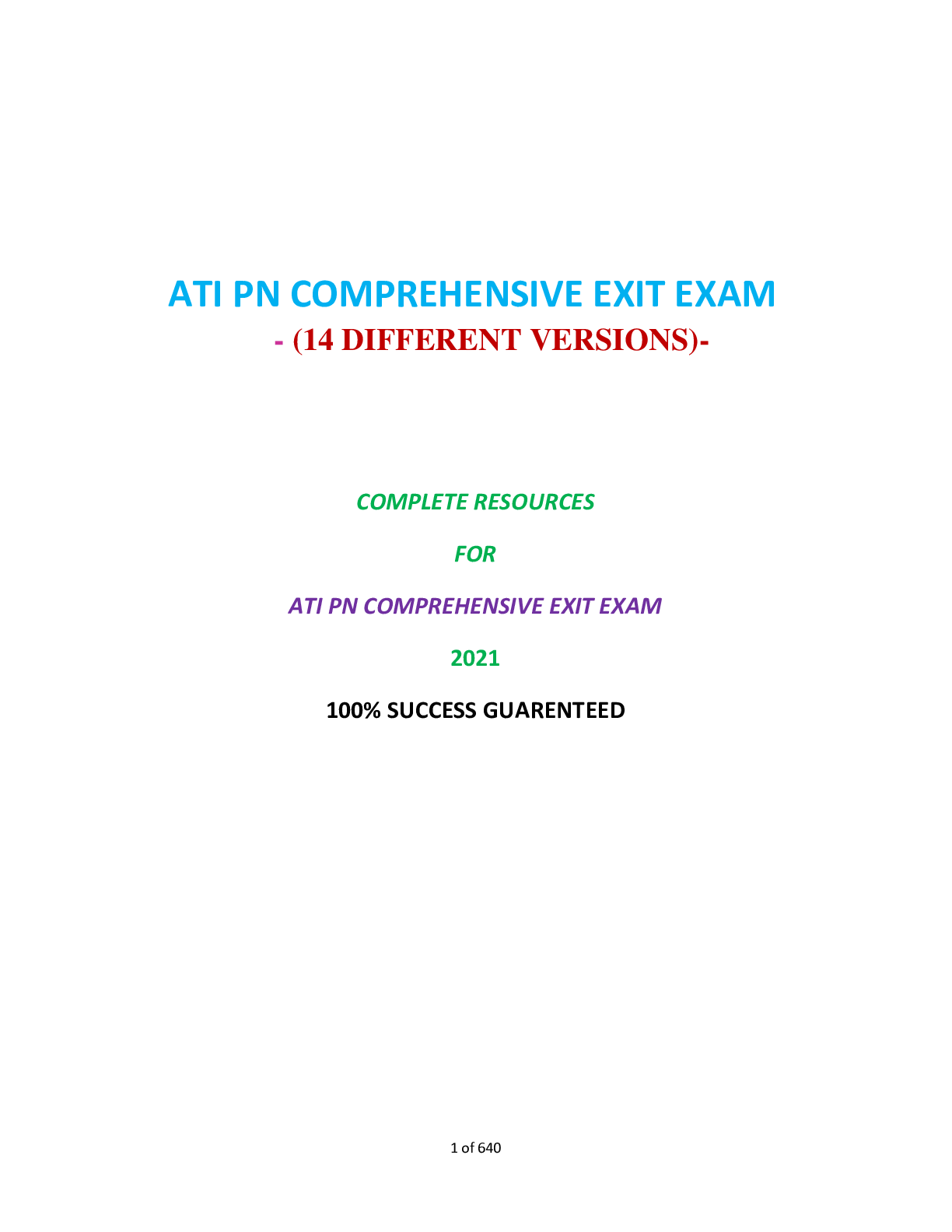
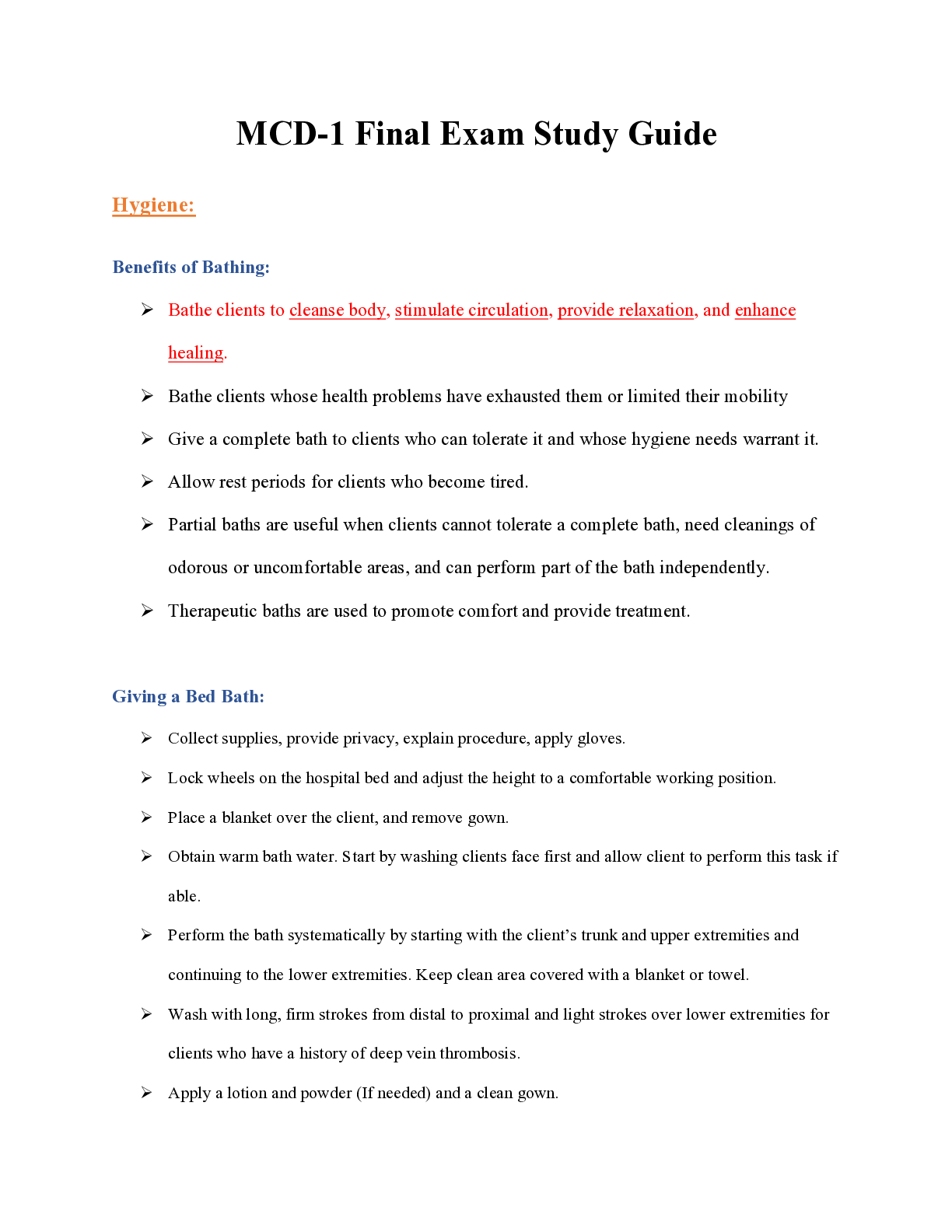
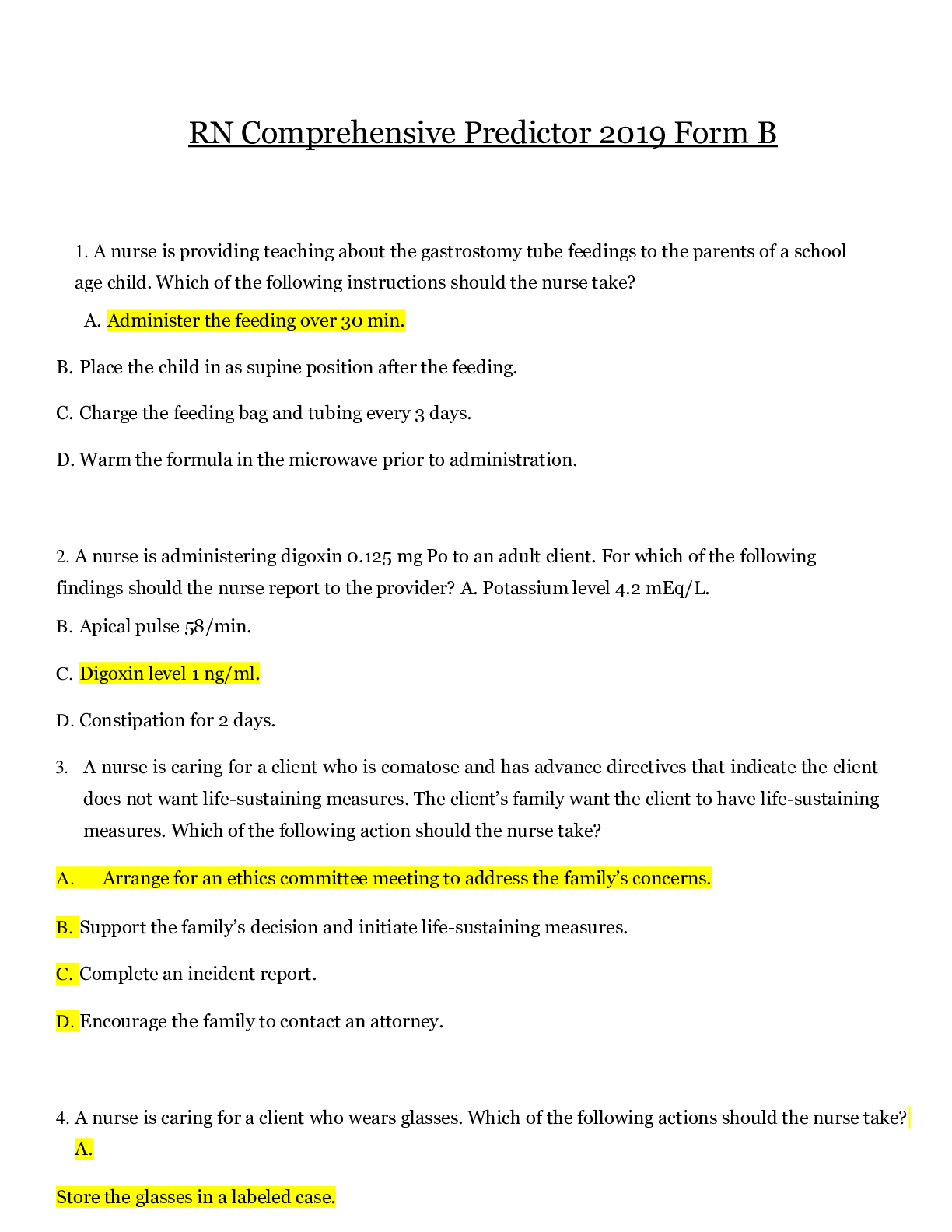

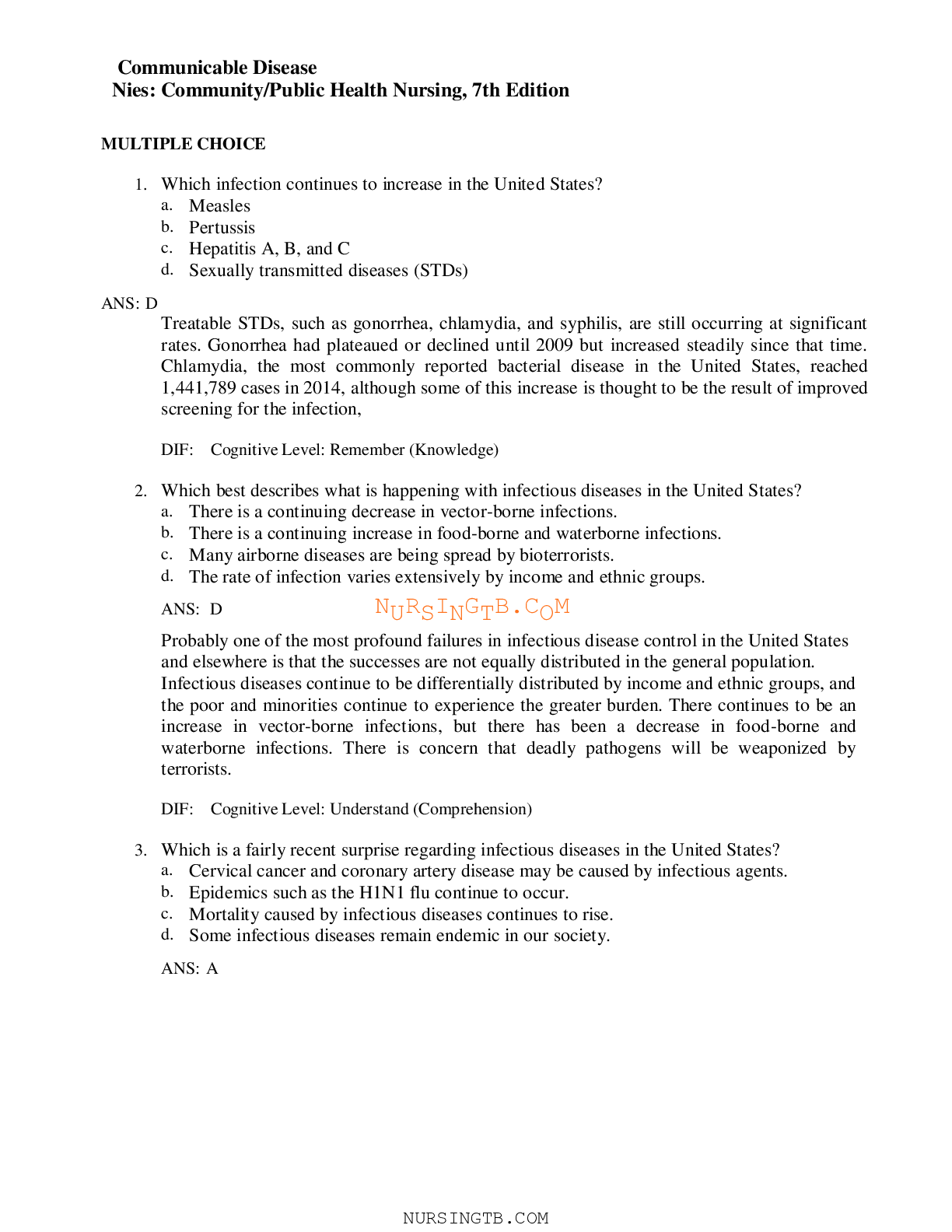

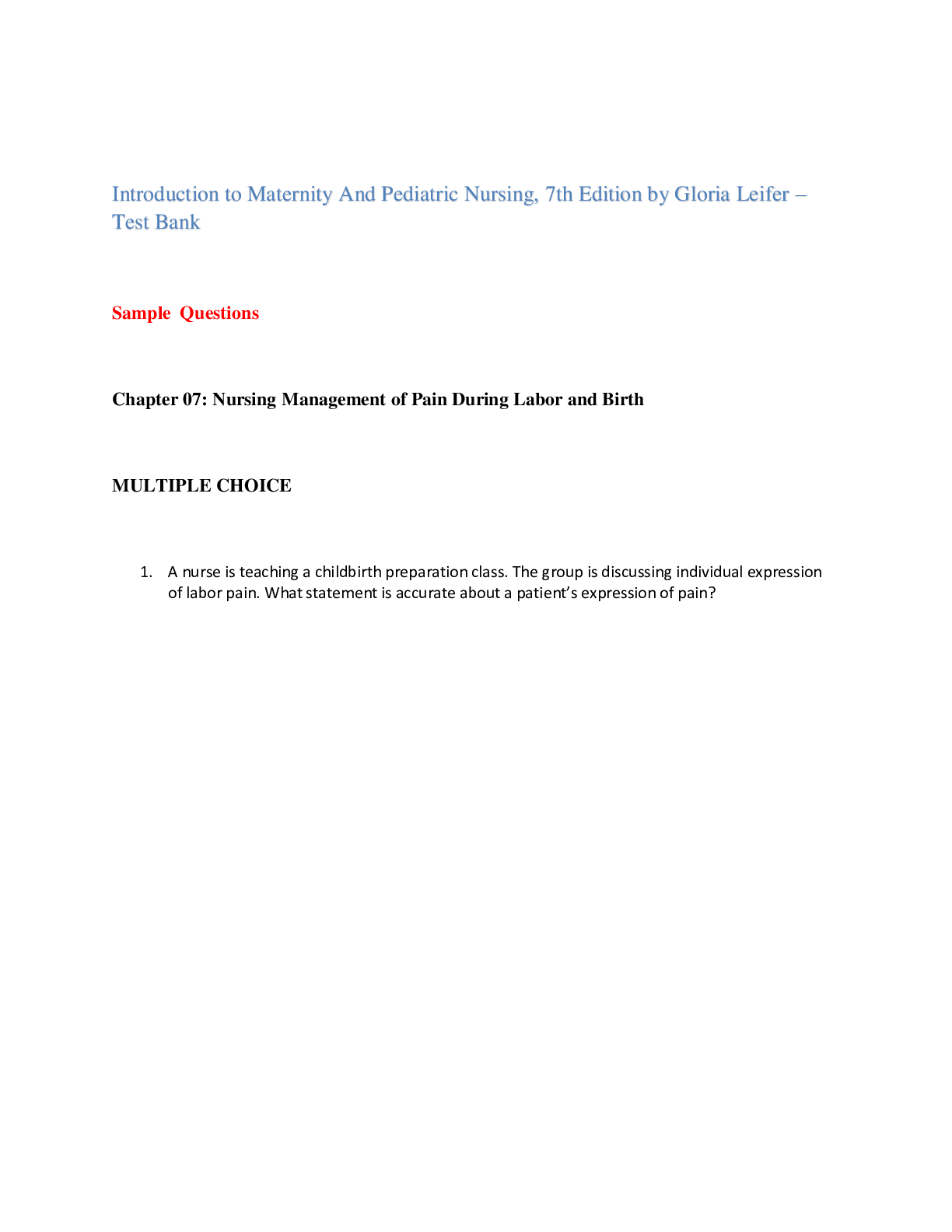
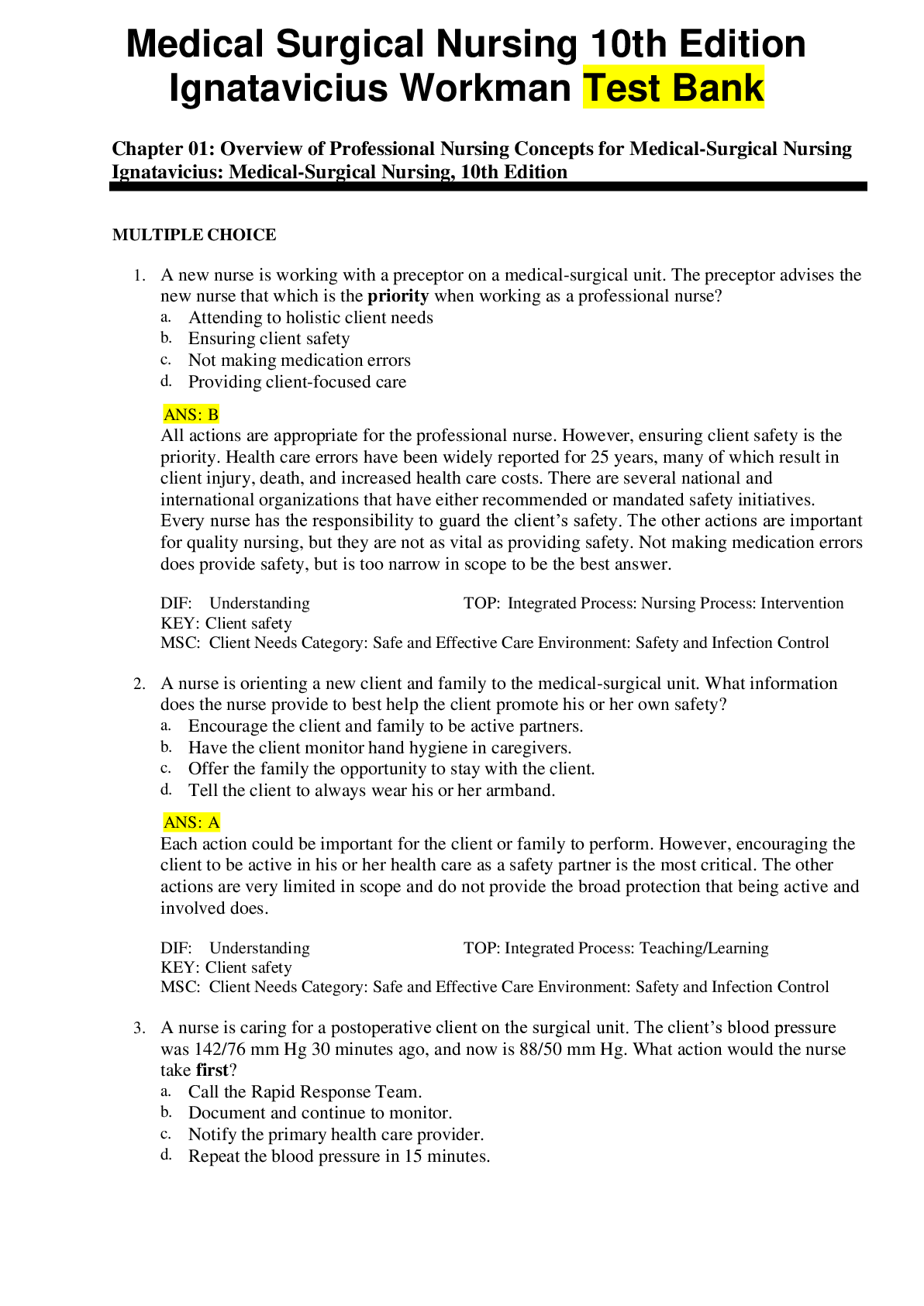

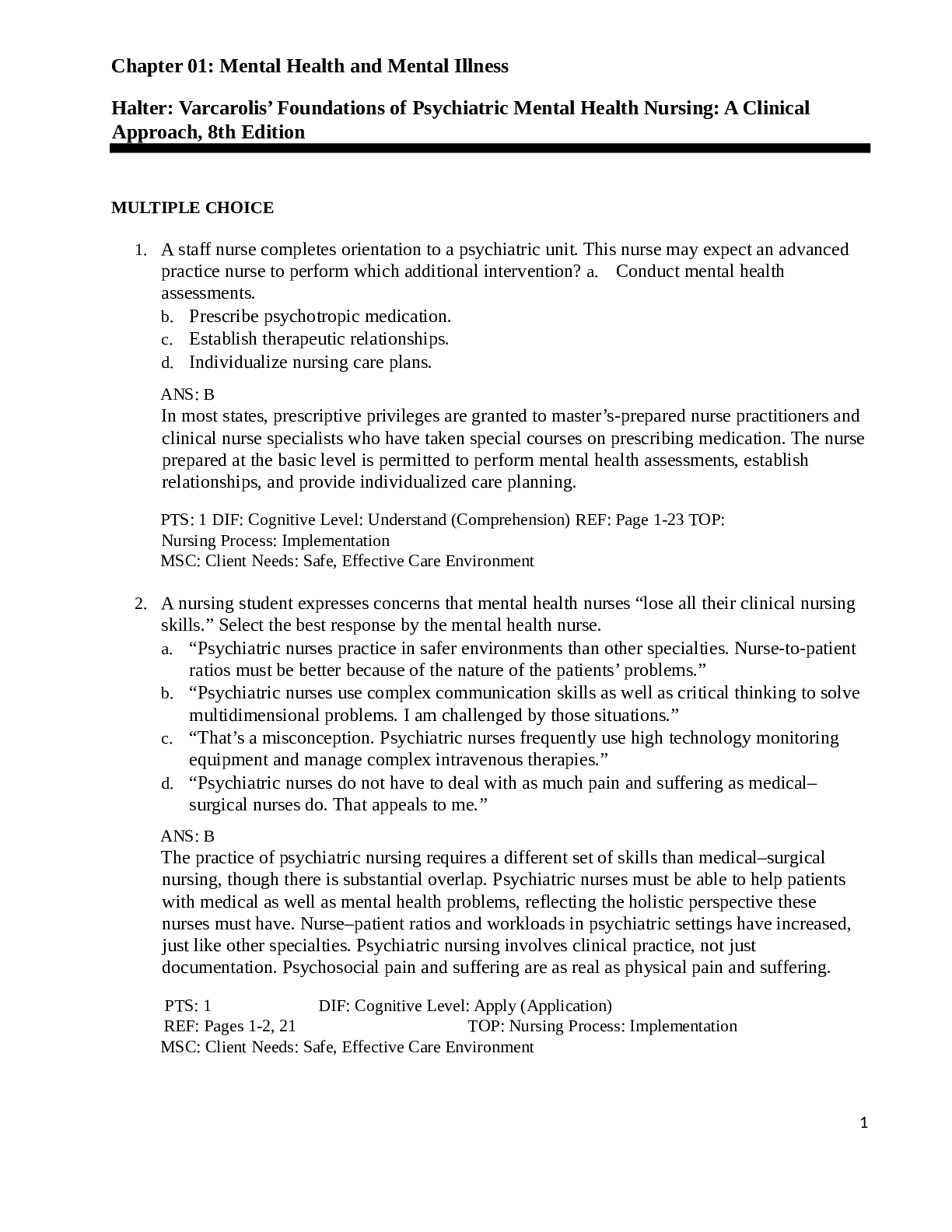
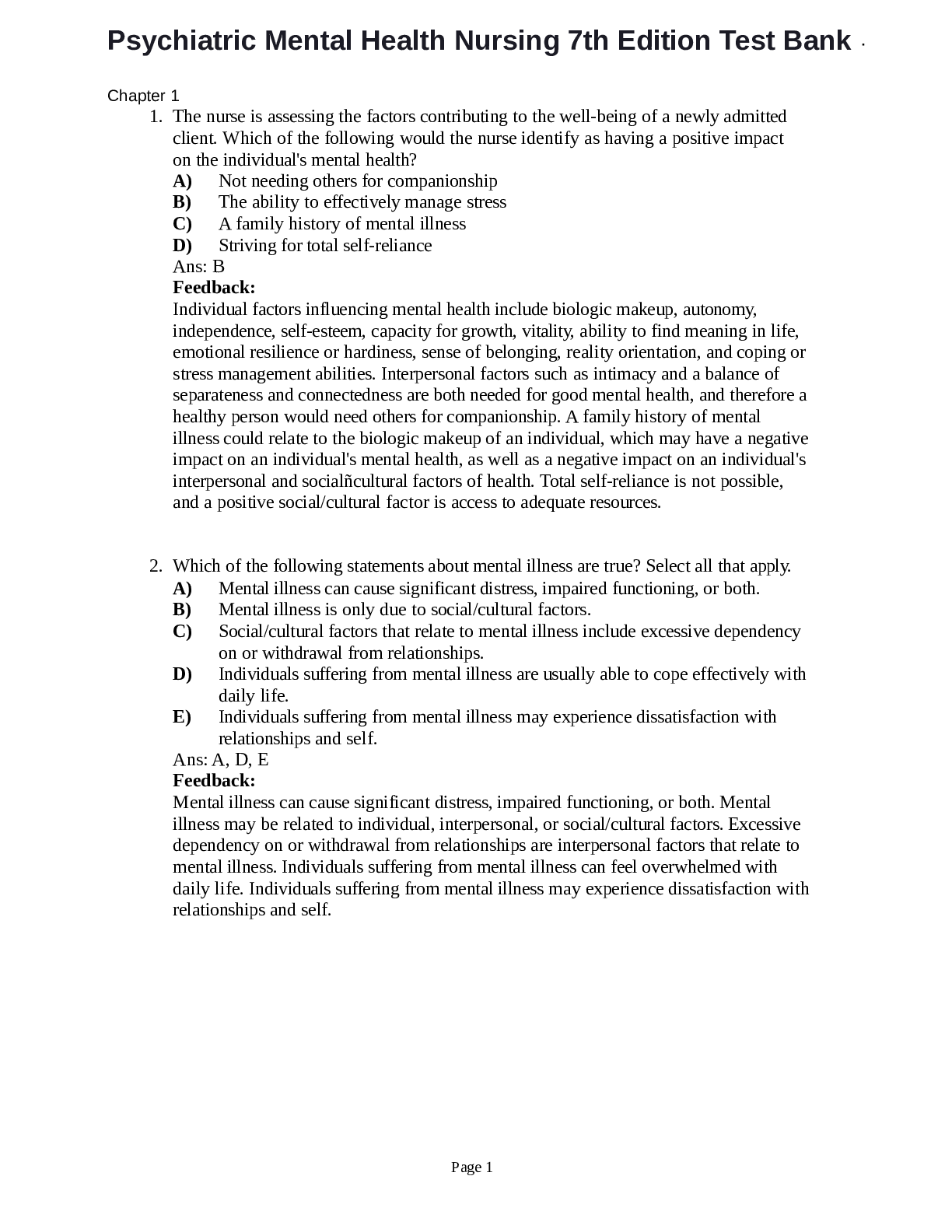
.png)
.png)
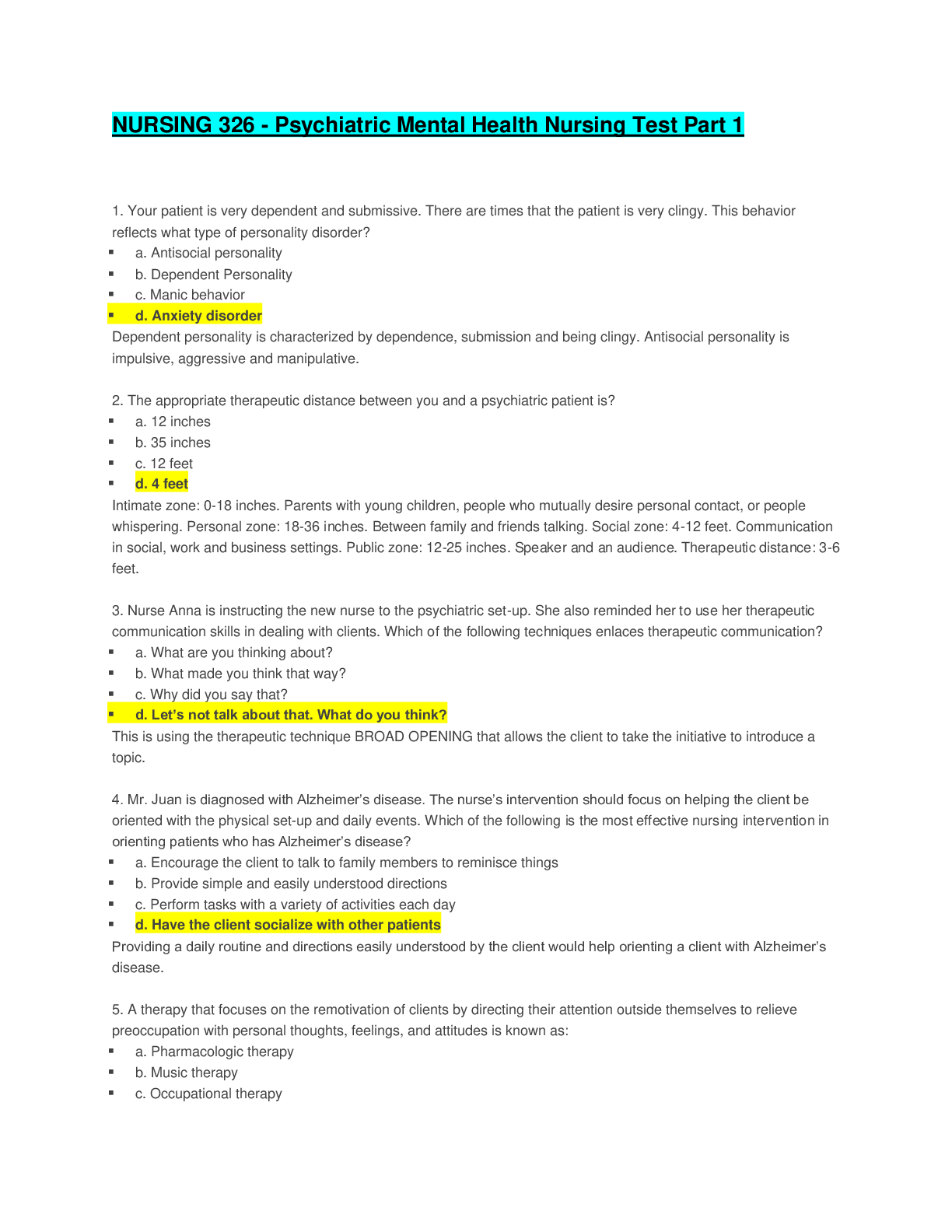


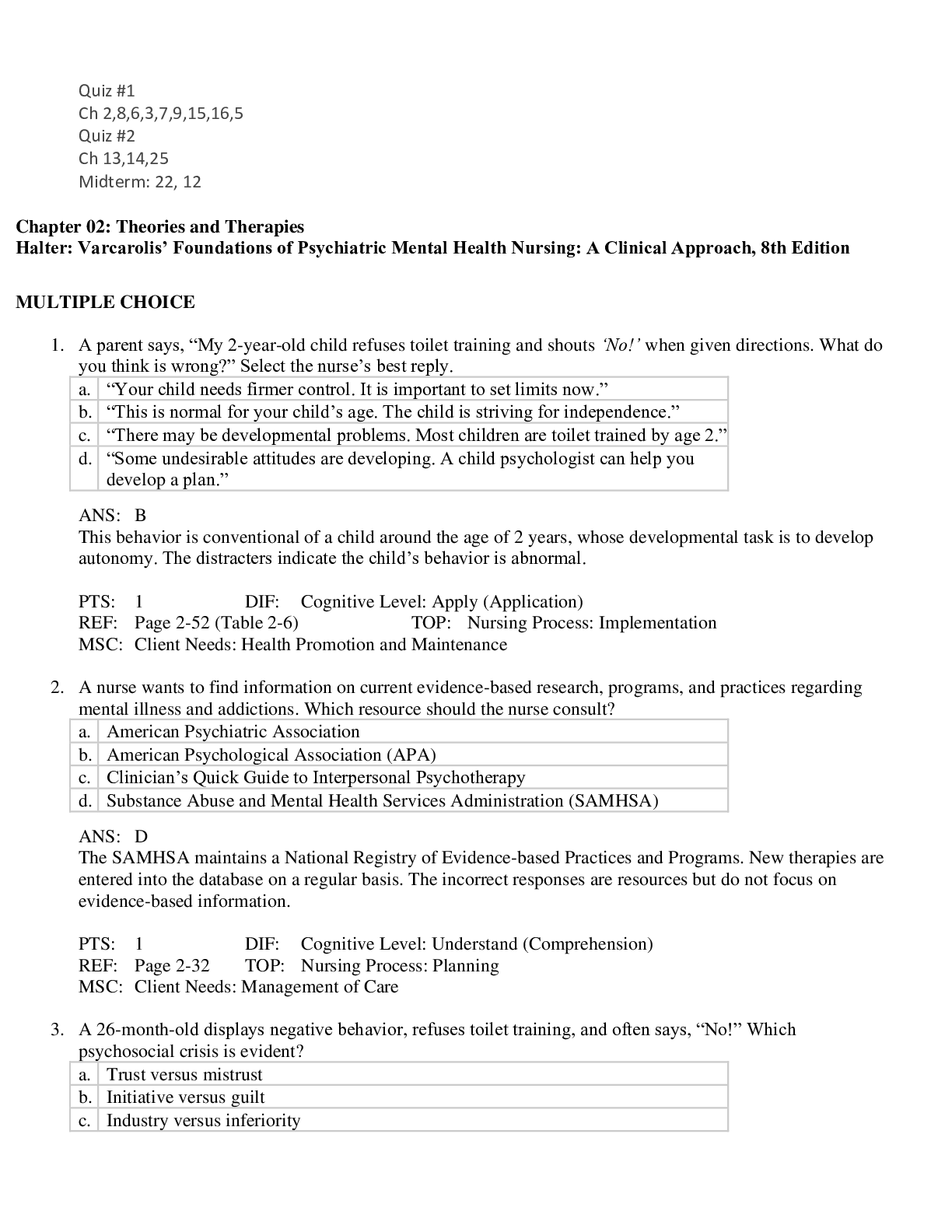
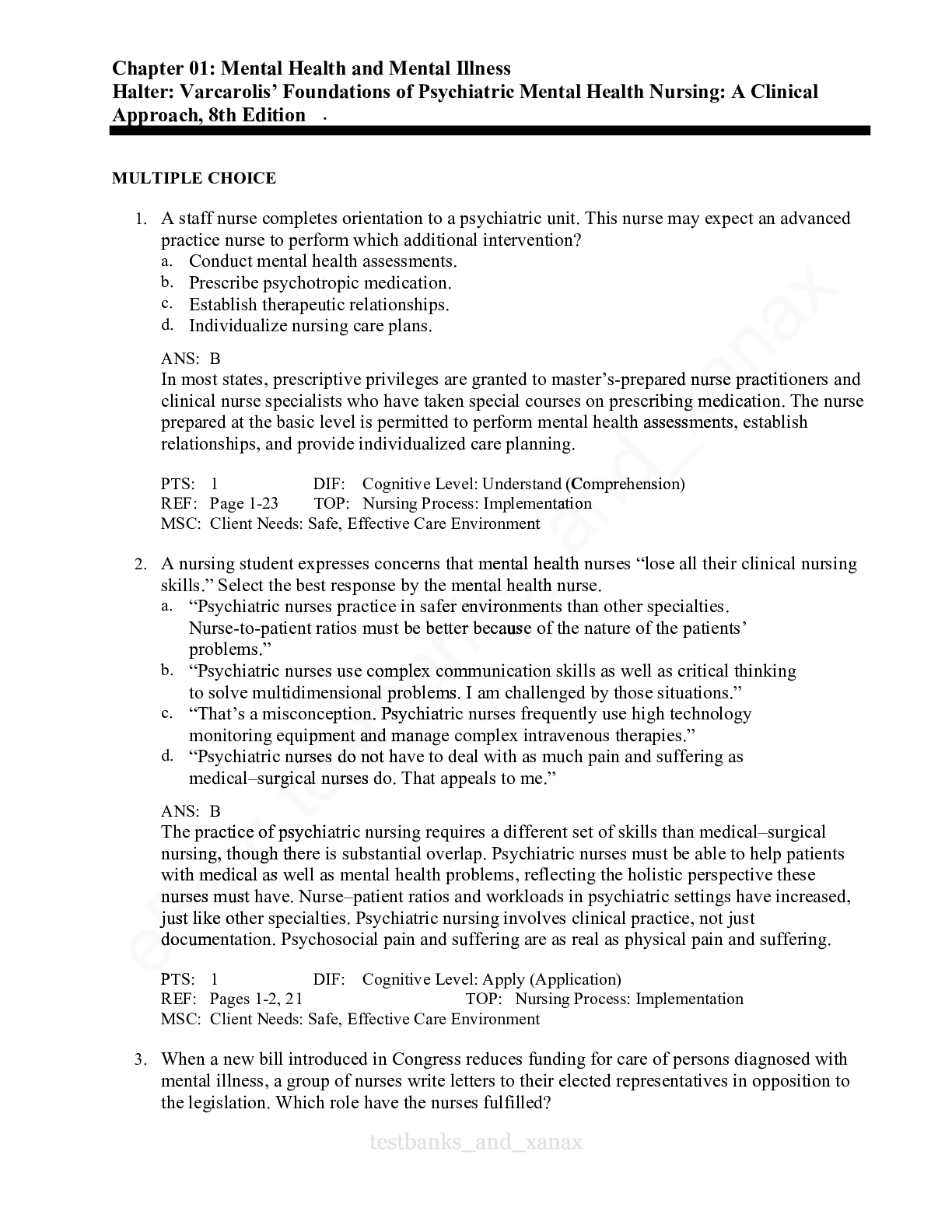

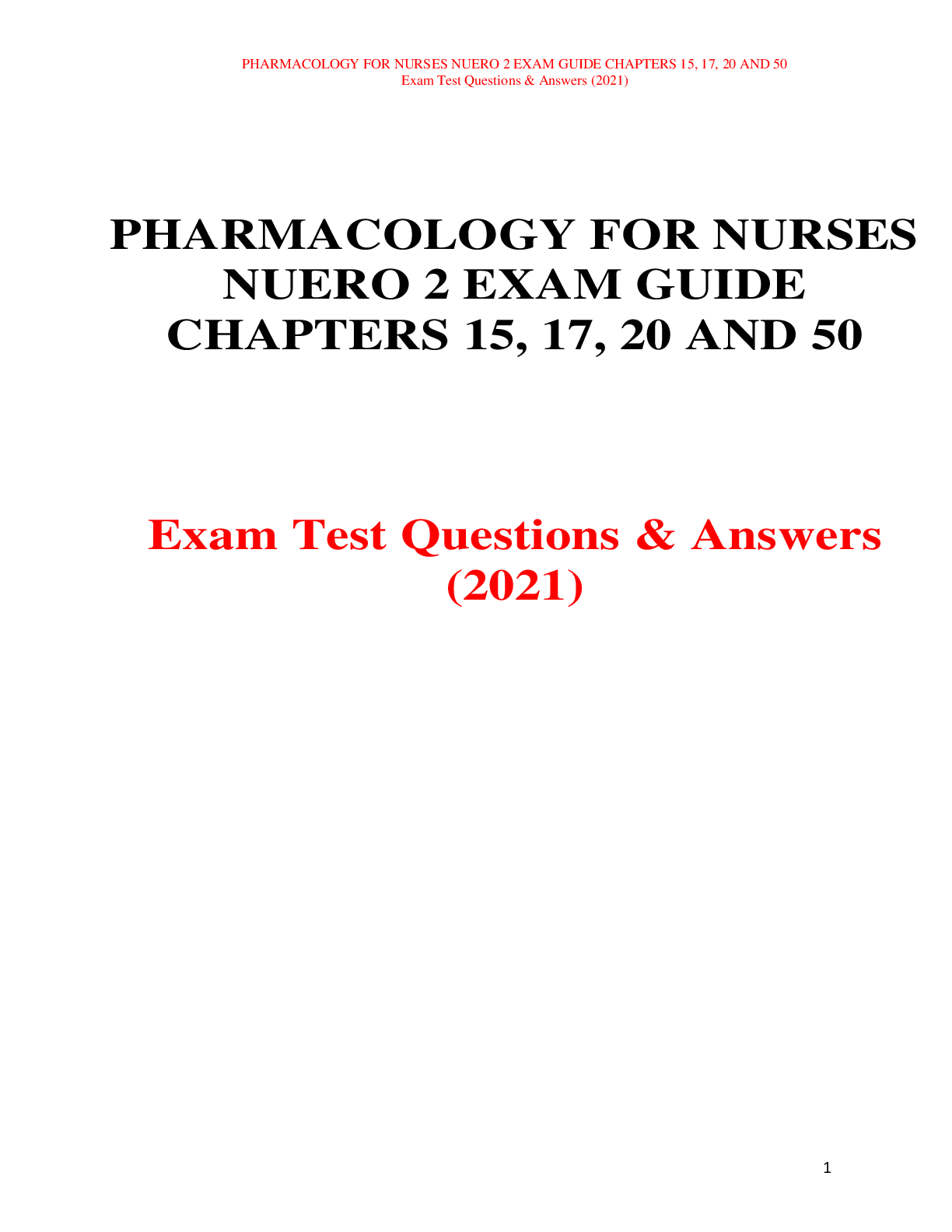
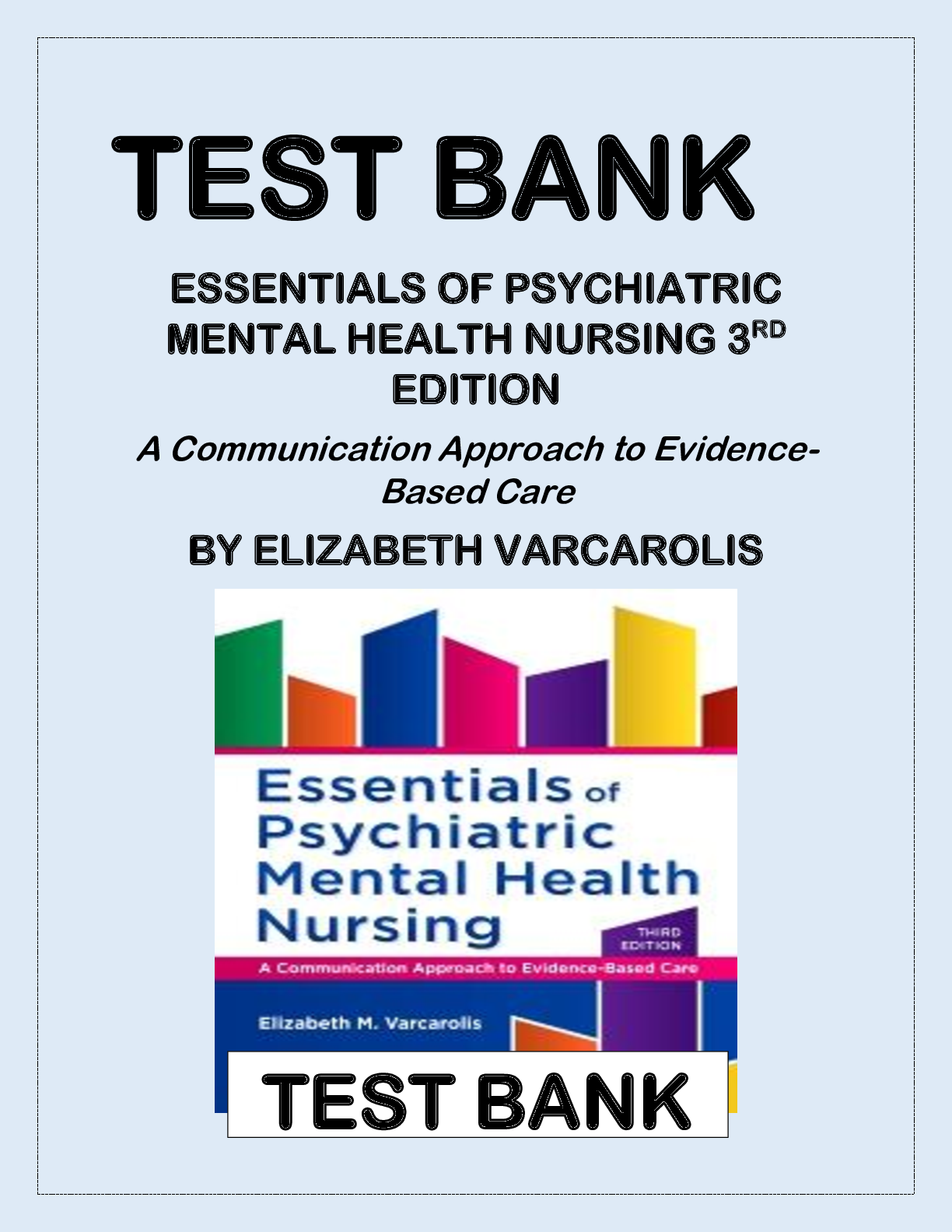
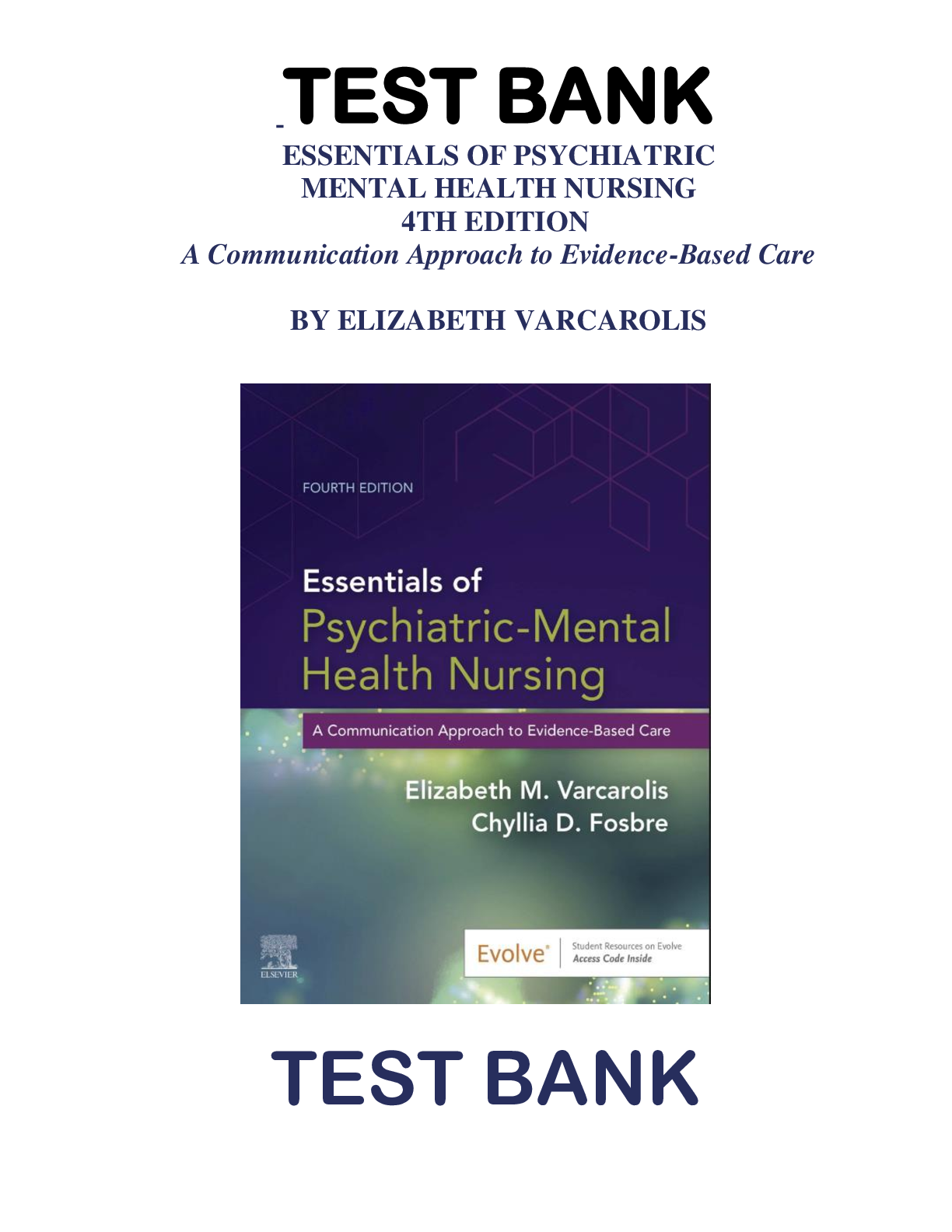
.png)
.png)
.png)

